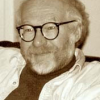Home » Jazz Musicians » Marius Nordal
Marius Nordal
Although I'm originally from NY, my parents moved to Seattle in 1949, when I was six. I took piano and violin lessons from a local teacher at age eight. I was growing up in that unfortunate era in pop music in the early 1950s where swing had died and rock'n'roll hadn't taken hold yet. It was totally bland city... all Doris Day, Mitch Miller and Frankie Lane. Then I heard Chuck Miller play Boogie Woogie on his recording of The House of Blue Lights. I was thirteen and immediately quit piano lessons and pursued jazz. That record became a number one hit and soon after, there was Bill Haley, Chuck Berry and Little Richard in pop music and, around the same time in jazz, there was early Miles, Coltrane, Cannonball and Bill Evans, and five years later, Herbie, Tony, Wayne and Chick Corea too. An astounding musical era in which to be a teenager!
From a 1999 All About Jazz Interview
All About Jazz: Talk about your history. What got you into jazz?
Marius Nordal: Although I'm originally from NY, my parents moved to Seattle in 1949, when I was six. I took piano and violin lessons from a local teacher at age eight. I was growing up in that unfortunate era in pop music in the early 1950's where swing had died and rock 'n' roll hadn't taken hold yet. It was totally bland city... all Doris Day, Mitch Miller and Frankie Lane. Then I heard Chuck Miller play Boogie Woogie on his recording of "The House of Blue Lights." I was thirteen and immediately quit piano lessons and pursued jazz. That record became a number one hit and soon after, there was Bill Haley, Chuck Berry and Little Richard in pop music and, around the same time in jazz, there was early Miles, Coltrane, Cannonball and Bill Evans, and five years later, Herbie, Tony, Wayne and Chick Corea too. An astounding musical era in which to be a teenager!
AAJ: How did your CD, Notoriety, evolve?
Read moreTags
Marius Nordal: Notoriety

by Jason West
Oscar Peterson used to advise his students not to be afraid of the piano. Somehow, I don’t think it was piano they feared.
Listening to Marius Nordal’s “Notoriety” can be just as intimidating. Nordal’s technical mastery of the piano is immediately apparent, and his arrangements---he’s worked primarily as a composer---are highly original. To echo the words of Count Basie, Nordal plays “a whole lot of piano,” and like all great music, the rewards are ultimately humbling, and greatly appreciated.
Amazingly, ...
Continue Reading























